What makes Fernandinho great? Everybody knows that Fernandinho is crucial to Manchester City’s success. And if they didn’t before, they certainly do after the last month. Manchester City’s two shock defeats to Crystal Palace and Leicester City coincided with the midfielders injury (now, like a good little stats monkey I shall remind you that correlation doesn’t equal causation etc etc and they should have won those games anyway, but also it was quite clear tactically they missed him desperately in midfield). The harder question is how did City become so reliant on a 33 year old playing a physically demanding position, and can they do anything to change it. Here’s what Fernandinho does. 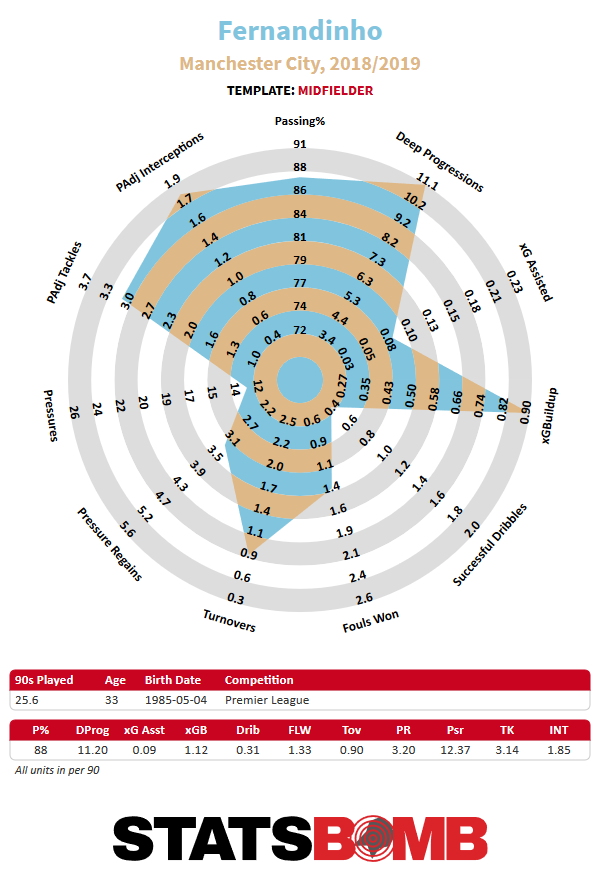 What makes him particularly unique is the way he combines both his attacking and defensive duties. On the defensive side of the ball, playing as the anchor of an elite pressing side he’s top 20 in the league in both possession adjusted tackles where he’s 12th in the league (among players with more than 800 minutes) with 3.06 and twelfth in the league in possession adjusted interceptions with 1.76. Though even that doesn’t quite tell the whole story. One of the most remarkable things about Manchester City’s press is how infrequently the team needs to clear the ball. The top of the possession adjusted clearances list is filled with defenders from teams that press high up the field. The top five are all from Liverpool, Arsenal and Tottenham. So are nine of the top twelve (with Adiran Mariappa of Watford and Michael Keane of Everton both of whom are high pressing squads making the list). Only Steve Cook of Bournemouth shows up as a center back clearing the ball while not obviously in an aggressive pressing system. But City’s center backs are nowhere to be seen. John Stones is 21st on the list and Aymeric Laporte is 26th. That’s not all down to Fernandinho of course, but he’s the lynchpin of a unique defensive system, one which not only presses opponents high up the field, but also one that allows center backs to recover the ball rather than clear it, and eases the burden on them so that they are really rarely called up as an emergency last line of defense. That’s what shielding a back line looks like. And this is how Fernandinho does it.
What makes him particularly unique is the way he combines both his attacking and defensive duties. On the defensive side of the ball, playing as the anchor of an elite pressing side he’s top 20 in the league in both possession adjusted tackles where he’s 12th in the league (among players with more than 800 minutes) with 3.06 and twelfth in the league in possession adjusted interceptions with 1.76. Though even that doesn’t quite tell the whole story. One of the most remarkable things about Manchester City’s press is how infrequently the team needs to clear the ball. The top of the possession adjusted clearances list is filled with defenders from teams that press high up the field. The top five are all from Liverpool, Arsenal and Tottenham. So are nine of the top twelve (with Adiran Mariappa of Watford and Michael Keane of Everton both of whom are high pressing squads making the list). Only Steve Cook of Bournemouth shows up as a center back clearing the ball while not obviously in an aggressive pressing system. But City’s center backs are nowhere to be seen. John Stones is 21st on the list and Aymeric Laporte is 26th. That’s not all down to Fernandinho of course, but he’s the lynchpin of a unique defensive system, one which not only presses opponents high up the field, but also one that allows center backs to recover the ball rather than clear it, and eases the burden on them so that they are really rarely called up as an emergency last line of defense. That’s what shielding a back line looks like. And this is how Fernandinho does it. 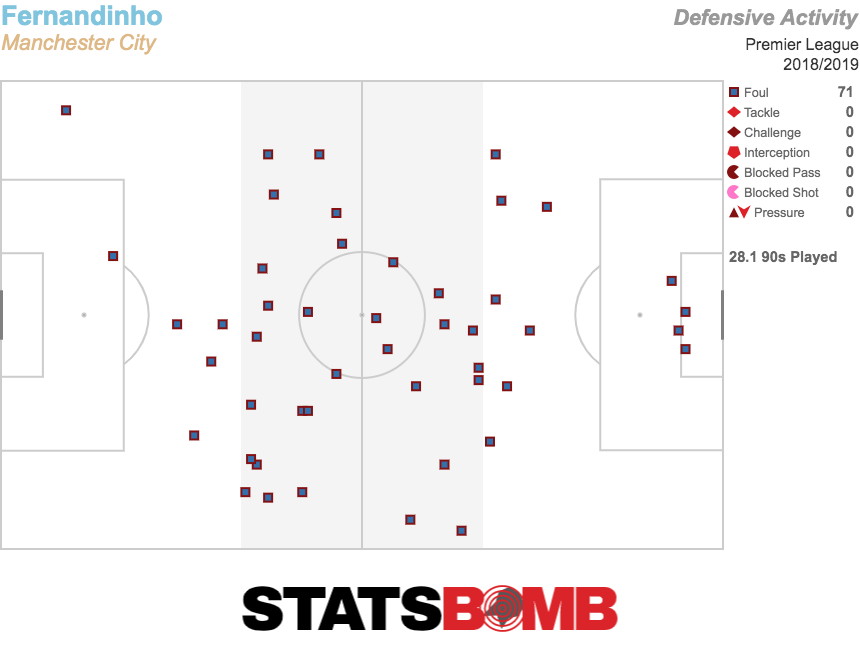 Fernandinho combines that activity at the base of midfield with an underrated ability to move the ball up the pitch. He’s fourth in the Premier League in deep progressions with 9.97 per 90 minutes. And again, that number doesn’t quite capture how unique his contribution is. While most deep lying players use longer passes to progress the ball, Fernandinho does not. There are only 10 players in the Premier League with over six deep progressions per game and under five unpressured long balls. Most of those players play much higher up the field than Fernandinho. Only Chelsea’s Jorginho, Liverpool’s Fabinho Fernandinho’s teammate Benjamin Mendy, Luke Shaw, Harry Winks and Aaron Creswell (sure why not?) play deeper positions. N’Golo Kante is also on this list though he is playing higher up the field as well. Putting it all together, Fernandinho is a player who relentlessly advances the ball into the final third while both not playing unpressured long passes and not leaving his defense exposed behind him. When looking at all the things Fernandinho does, very few players tick all those boxes. Combine the attacking side with possession adjusted tackles over two and possession adjusted interceptions over one and its only Kante, Fabinho, Jorgrinho, and Dele Alli who tick all of those statistical boxes. Alli plays higher up the pitch. Kante does too this season, although one can certainly imagine him doing everything Fernandinho does. Jorginho, just barely sneaks into this category on the defensive side of the ball. Given these numbers, it’s both easy to understand why City tried to acquire him last summer and also easy to suspect he wouldn’t have been up to the defensive responsibility. Then there’s Fabinho. He, out of everybody, comes closest to replicating the Fernandinho experience, although he does have the added benefit of spending most of his time in a double pivot with added midfied support. Looking abroad, the pickings are similarly slim. In Spain only 33 year old fullback Felipe Luis fits the bill. In Germany there are three. Mitchell Weiser, a 24 year old right back for Bayer Leverkusen, Leon Goretzka Bayern Munich’s big acquisition from last summer and perhaps most excitingly Florian Grillistch, Hoffenheim’s young 23 year old do it all midfielder.
Fernandinho combines that activity at the base of midfield with an underrated ability to move the ball up the pitch. He’s fourth in the Premier League in deep progressions with 9.97 per 90 minutes. And again, that number doesn’t quite capture how unique his contribution is. While most deep lying players use longer passes to progress the ball, Fernandinho does not. There are only 10 players in the Premier League with over six deep progressions per game and under five unpressured long balls. Most of those players play much higher up the field than Fernandinho. Only Chelsea’s Jorginho, Liverpool’s Fabinho Fernandinho’s teammate Benjamin Mendy, Luke Shaw, Harry Winks and Aaron Creswell (sure why not?) play deeper positions. N’Golo Kante is also on this list though he is playing higher up the field as well. Putting it all together, Fernandinho is a player who relentlessly advances the ball into the final third while both not playing unpressured long passes and not leaving his defense exposed behind him. When looking at all the things Fernandinho does, very few players tick all those boxes. Combine the attacking side with possession adjusted tackles over two and possession adjusted interceptions over one and its only Kante, Fabinho, Jorgrinho, and Dele Alli who tick all of those statistical boxes. Alli plays higher up the pitch. Kante does too this season, although one can certainly imagine him doing everything Fernandinho does. Jorginho, just barely sneaks into this category on the defensive side of the ball. Given these numbers, it’s both easy to understand why City tried to acquire him last summer and also easy to suspect he wouldn’t have been up to the defensive responsibility. Then there’s Fabinho. He, out of everybody, comes closest to replicating the Fernandinho experience, although he does have the added benefit of spending most of his time in a double pivot with added midfied support. Looking abroad, the pickings are similarly slim. In Spain only 33 year old fullback Felipe Luis fits the bill. In Germany there are three. Mitchell Weiser, a 24 year old right back for Bayer Leverkusen, Leon Goretzka Bayern Munich’s big acquisition from last summer and perhaps most excitingly Florian Grillistch, Hoffenheim’s young 23 year old do it all midfielder. 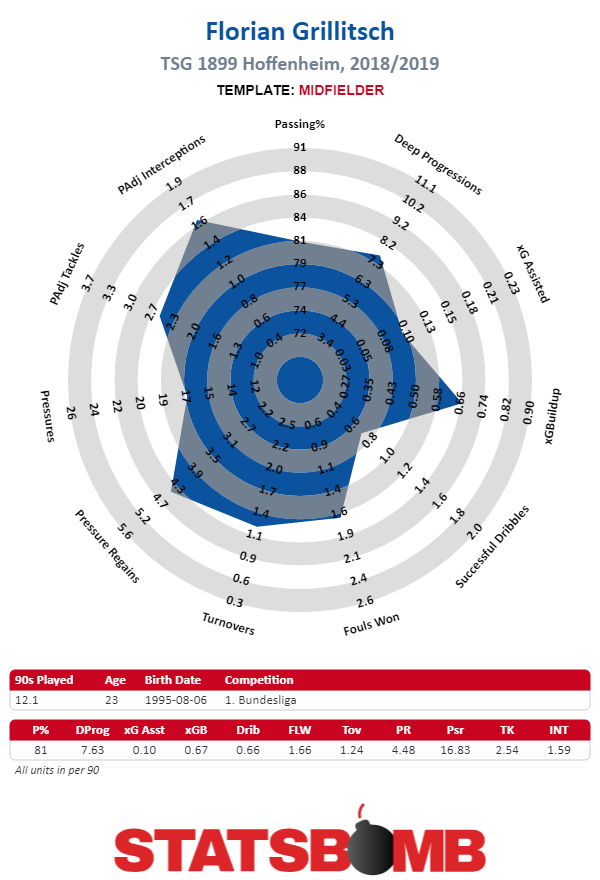 There are also only two players who have that collection of stats in Italy, and one of them already washed out once in England in AC Milan’s Tiemoué Bakayoko and he just barely clears the ball progression bar anyway. The other is Atalanta’s Remo Freuler. Who is, at the very least, intriguing.
There are also only two players who have that collection of stats in Italy, and one of them already washed out once in England in AC Milan’s Tiemoué Bakayoko and he just barely clears the ball progression bar anyway. The other is Atalanta’s Remo Freuler. Who is, at the very least, intriguing. 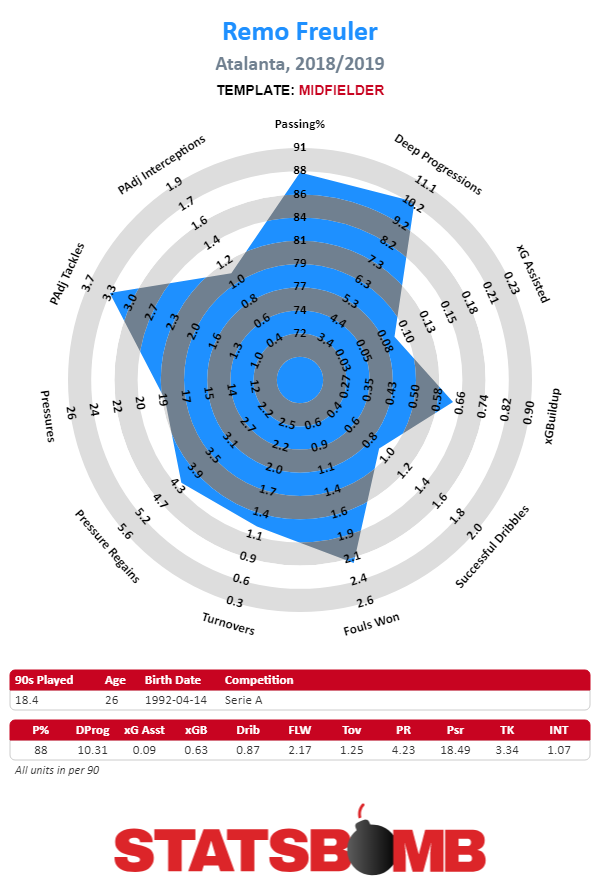 And finally in France there’s Marseille’s Bouna Sarr, who just barely does enough ball progression to crack the list (and is a fullback, sense a pattern here), everybody’s favorite midfield transfer target, Lyon’s Tanguy NDombele, currently rumored to be City’s first choice
And finally in France there’s Marseille’s Bouna Sarr, who just barely does enough ball progression to crack the list (and is a fullback, sense a pattern here), everybody’s favorite midfield transfer target, Lyon’s Tanguy NDombele, currently rumored to be City’s first choice 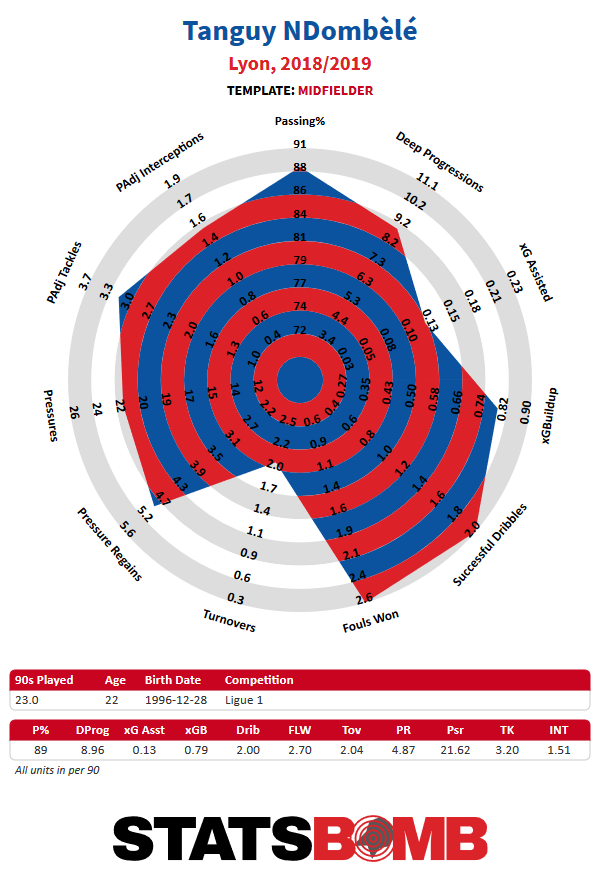 and also his 20(!) year-old teammate Houssem Aouar, who does just barely enough of everything to make the cut.
and also his 20(!) year-old teammate Houssem Aouar, who does just barely enough of everything to make the cut. 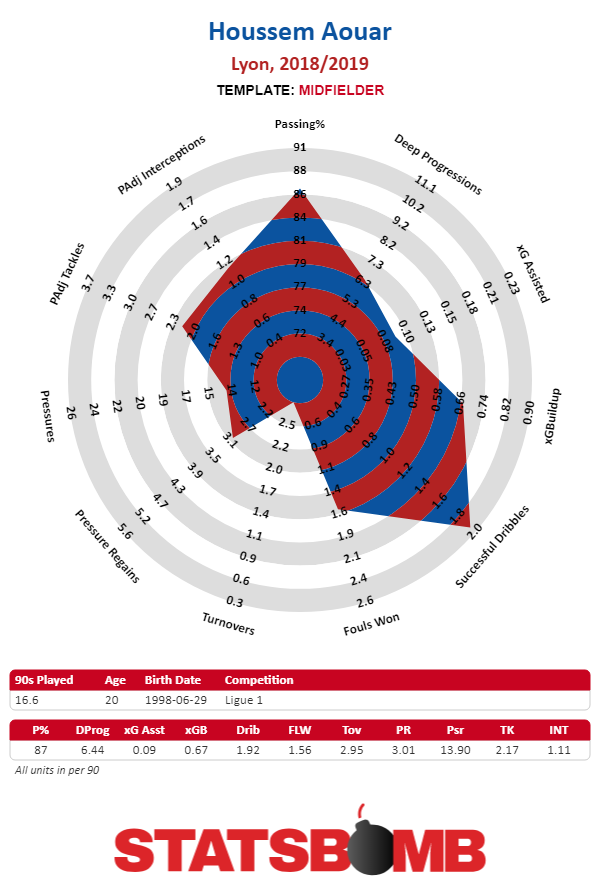 That quick tour around Europe shows a couple of things. First, there simply aren’t very many players that do what Pep Guardiola wants his deepest midfielder to do. Second, even the players who in theory do all those things, are not infrequently fullbacks, a fact which certainly fits with Guardiola’s career of merging the responsibilities of those two positions. Third, even the players who do do it all aren’t nearly as good at it as Fernandinho is. He is both an all around star, and elite at progressing the ball. That’s not to say there aren’t players who could possibly step up and fill Fernandinho’s shoes that aren’t on this list, but to do it effectively they’ll have to show a greater aptitude on one side of the ball or the other than they have to date. Guardiola demands an exceptionally broad range of skills from the player at the base of his midfield. They have to handle both defensive and attacking transition, defend in space, protect the back line and also bring the ball forward with their feet. Fernandinho does all that. The reason City have yet to develop a backup plan for him, is that very few other players in the world can compare.
That quick tour around Europe shows a couple of things. First, there simply aren’t very many players that do what Pep Guardiola wants his deepest midfielder to do. Second, even the players who in theory do all those things, are not infrequently fullbacks, a fact which certainly fits with Guardiola’s career of merging the responsibilities of those two positions. Third, even the players who do do it all aren’t nearly as good at it as Fernandinho is. He is both an all around star, and elite at progressing the ball. That’s not to say there aren’t players who could possibly step up and fill Fernandinho’s shoes that aren’t on this list, but to do it effectively they’ll have to show a greater aptitude on one side of the ball or the other than they have to date. Guardiola demands an exceptionally broad range of skills from the player at the base of his midfield. They have to handle both defensive and attacking transition, defend in space, protect the back line and also bring the ball forward with their feet. Fernandinho does all that. The reason City have yet to develop a backup plan for him, is that very few other players in the world can compare.
2019
Is Manchester City's Fernandinho Irreplaceable?
By Kevin Lawson
|
January 11, 2019